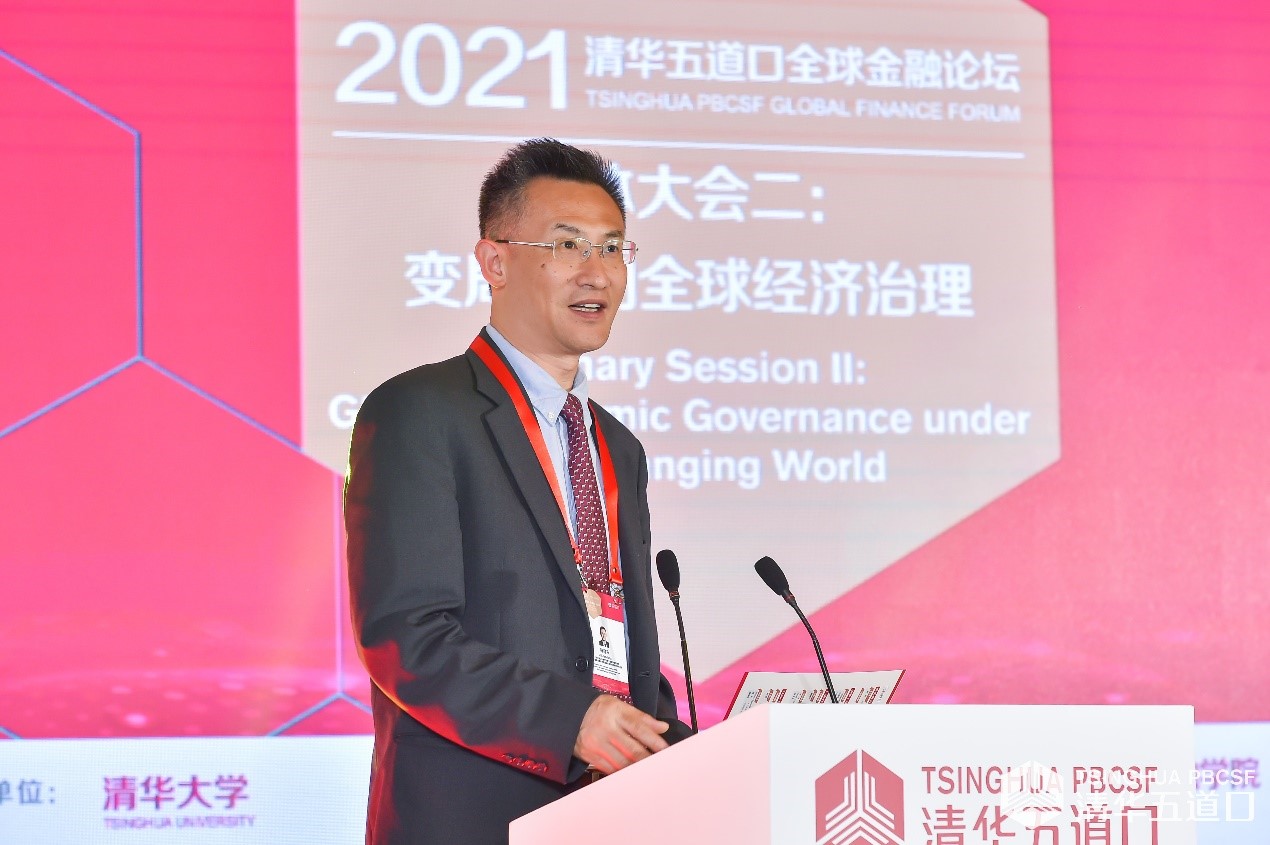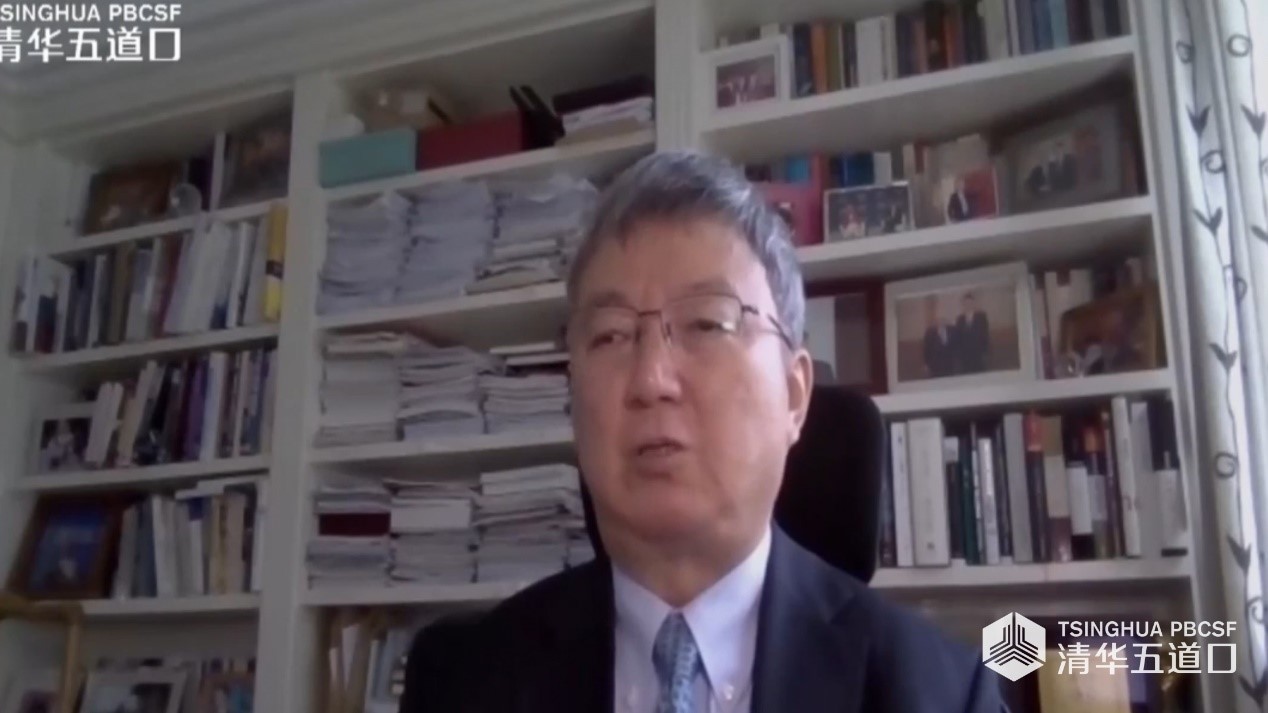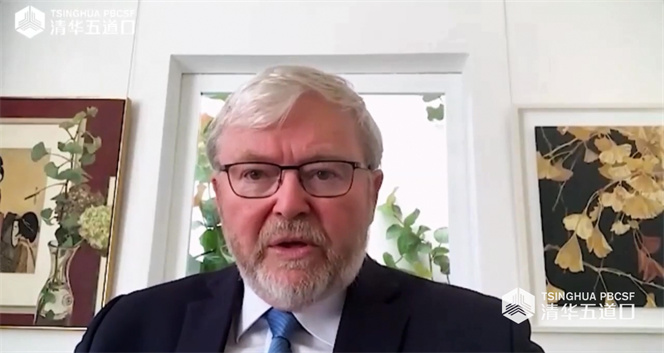2021 Tsinghua PBCSF Global Finance Forum
Plenary Session II: Global Economic Governance
under the Changing World
As the current global economic structure has been rapidly changing, new requirements have been put forward for the reform of the global governance system. The outbreak of the COVID-19 pandemic has highlighted the chaos and deficiencies in the global governance structure; global economic governance under the changing world has become a critical issue faced by the international society. Plenary session II of the 2021 Tsinghua PBCSF Global Finance Forum was hosted by Professor JU Jiandong, Unigroup Chair Professor of Tsinghua PBCSF, and Director of the Center for International Finance and Economics Research (CIFER), NIFR.
JU Jiandong mentioned that the current world is undergoing major changes unseen in a century, and the content of these changes become different every year. Four years ago, the major change we mentioned was the new round of technological revolution represented by artificial intelligence. Three years ago, the major change is ushered in an era of global competition. Last year’s change was an epidemic that has not been encountered in a century. At present, we need to focus on carbon neutrality and climate change issues. At the moment when international forces are adjusted, peace and development are still the themes of the times, and the concept of a community with a shared future for mankind is deeply rooted in the hearts of the people. At the time of this profound adjustment of the international structure, the current global governance system has been unable to adapt to the development of the times. At present, it is the general trend to push the reform of the global governance system.

JU Jiandong
Focusing on "Global Economic Governance under the Changing World", ZHU Min, Chair of the National Institute of Finance of Tsinghua University and the Former Deputy Managing Director of the International Monetary Fund, delivered a keynote speech. The Former Prime Minister of Australia, Kevin Michael RUDD, also shared his views on this topic and discussed with Chair ZHU Min.
The current global governance system becomes outdated, and it is necessary to establish global political leadership centered on the G20

ZHU Min
ZHU Min discussed the mechanism of the global economic governance under the changing world from three aspects. First of all, the sudden outbreak of the COVID-19 epidemic in 2020 shows that the global economic and financial governance system built 70 years ago is extremely outdated. After the pandemic outbreak, there was a lack of coordination and cooperation around the world; developing countries faced prominent financing difficulties; and there were numerous problems in the R&D, manufacturing and distribution process of vaccine. On the one hand, some developed countries are hoarding vaccines several times their population. On the other hand, in some developing countries, vaccine injection rate is less than 1%. However, viruses know no borders, thus this situation must be changed. Although the pandemic happened in a sudden, it has exposed a flaw in our existing global governance system.
Secondly, the current global economic governance mechanism has lagged far behind the reality and needs of the global economy. It can no longer provide sufficient public products for global economic development and changes, nor can it reflect the current changes in world economic and financial strength. The existing global economic governance mechanism is the Bretton Woods system, established in 1945. From 1945 to 2020, the global economic structure has undergone tremendous changes. Currently, emerging economies have become the most important driving force of the global economy, but they don’t have enough voice in the global governance system. On the other hand, the global governance system 70 years ago can no longer address new challenges, such as climate change, carbon neutrality, sustainable development, public health, cyber security, digital economy, platform economy, and global supervision of financial technology.
The third issue is that we have to build political leadership for global governance centered on the G20. The Bretton Woods system built in 1945 is basically a global political leadership dominated by G7 countries, and it can no longer represent the current new forces in the global economic field. The 2008 global crisis gave birth to the G20 group. This was a historical progress. However, the current G20 lacks a permanent institution to investigate, recommend and implement the G20 political decisions. Therefore, when we are considering reforming and building a new global governance mechanism to cover and address new major challenges to provide global public goods, we need to consider top-level design, which is to build the G20 to become the top leadership of the global economic governance. We need to specify its functions, status, and implementation capabilities, and build the G20 into a true political force that represents the global economy and finance.
Implementation is crucial for the global governance system, and requires multi-country cooperation to play the role of G20 as a mediator

Kevin Michael RUDD
Kevin Rudd said that, first of all, since a large number of current social and economic activities are cross-border, the global governance system is very important. Secondly, the current global governance mechanisms are not incompetent theoretically. For example, the purpose of the WHO and the conventions of United Nations are clearly expressed, but what we lack is the implementation mechanism to make these conventions operational and bring their effects into practice. Therefore, Kevin Rudd believes that the best existing global governance mechanisms is the G20. Although we still have international organizations such as WHO, WTO, International Monetary Fund and World Bank, these organizations lack sufficient political leadership.
It is difficult to make the G20 an institution with practical global governance capabilities, because in the framework of the G20, it is necessary to achieve consistency among different countries. From a realist perspective, Washington, Beijing, and Brussels are all involved. The governance of future economic, trade, epidemic, and climate issues require the cooperation of major global forces such as China, the United States and Europe. It is a difficult challenge to make the G20 a multi-functional multilateral mechanism that gathers every country’s political capital. Traditional multilateralism and pure bilateralism are not feasible, so Kevin Rudd emphasizes the third option like the G20.
G20 can indeed become a global economic center to play a mediating role. Specifically, it can work from two aspects: one is to change the rotation mechanism, such as establishing a G20 permanent secretariat in Suez or Singapore; the other is to adjust the bulletin to a decision-making mechanism and let other international organizations adopt it.